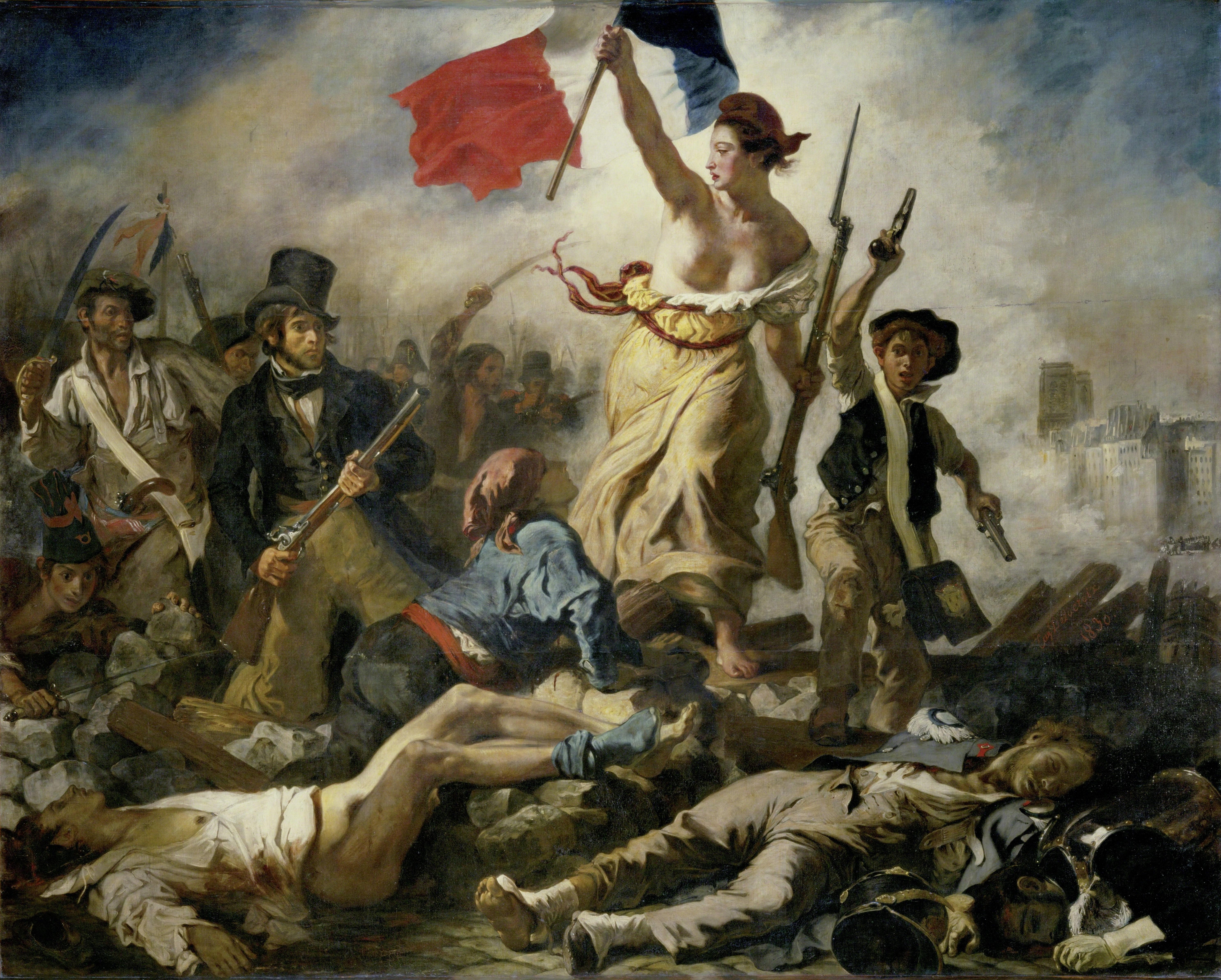
Have you ever heard La Marseillaise, the French national anthem? The music is beautiful, but the lyrics are not easy to decipher, full of old-fashioned words and unusual turns of phrases.
Play it in front of a French audience, and suddenly, everybody starts singing along. We all know the lyrics, and there is something strangely captivating in its ferocity. I’ve seen the most reserved people start to raise their voices like there was no tomorrow just from hearing the first notes of our national anthem.
Moving and emotional for some, thrilling and vibrant for others, the Marseillaise was also called racist and xenophobic, anachronistic and obsolete, a bloodthirsty call to arms. Opinions vary, and this is also what makes it such an interesting piece of French history and a fascinating object of study.
In this article, we will begin by discussing the history and creation of the French national anthem. We’ll then talk about its lyrics, contemporary uses, and the criticisms it has received.

“La Marseillaise”, by François Rude, on the Arc de Triomphe.
 Table of Contents
Table of Contents
- From Military Song to National Anthem
- Lyrics of La Marseillaise
- When is it Played?
- Should France Find a New National Anthem?
- Le mot de la fin
1. From Military Song to National Anthem
Contrary to what is often believed, the Marseillaise was not born in the city of Marseille but in the region of Alsace, during the war against Austria.
As the king saw his power slipping away, Louis XVI hoped that a French military defeat would allow him to restore his authority. He declared war on the king of Bohemia and Hungary on April 20, 1792. Little did he know that it would be fatal to him, nor that it would generate the rallying song of the French for generations to come.
After two months of chaotic skirmishes, the Baron de Dietrich, mayor of Strasbourg, realized that the French troops lacked a unifying song. He turned to his friend, the officer Rouget de Lisle, a musician and poet in his spare time. Rouget de Lisle was inspired by a propaganda poster, and composed an energetic tune by drawing from other known marches and hymns.
He worked on it during the night of June 25, 1792, and the next day, Le Chant de guerre pour l’armée du Rhin (“War song for the army of the Rhin”) was born.

Rouget de Lisle, singing La Marseillaise
At the end of July, the French troops were forced to retreat in front of Prussia, who had come to the aid of Austria. French volunteers were called in from all over France to reinforce the ranks. In August, the federates from Marseille landed in Paris, taking with them this now revolutionary song. It was only later that it was renamed La Marseillaise.
It was a pivotal moment for the country and the genesis of the Republic, since on August 10 the federates invaded the Tuileries and locked up the king and his family, thus putting an end to almost a thousand years of absolute monarchy. On July 14, 1795, the Marseillaise was recognized as one of the “airs and civic songs that have contributed to the success of the Revolution.”
Then came Napoleon, and – Plot twist! – he banned the song in 1815, because of its Revolutionary association. It remained banned for nearly thirty years. The second revolution of 1830 put it back in the spotlight, before it was decreed national anthem under the Third Republic (1879).

The French Revolution
2. Lyrics of La Marseillaise
For the longest time, there was no official version of La Marseillaise, which regularly provoked some awkward musical disturbances during its performance. The original manuscript has 6 verses. A 7th verse, often called le couplet des enfants (“The children’s verse”), was added later.
Additional lesser-known verses have been omitted from the national anthem. It brings the total number of verses to a whopping 15. But as you’re not likely to ever hear these added verses, let’s stick to the official 7.
Verse 1
| Allons enfants de la Patrie, Le jour de gloire est arrivé ! Contre nous de la tyrannie, L’étendard sanglant est levé ! (bis) Entendez-vous dans les campagnes Mugir ces féroces soldats ? Ils viennent jusque dans nos bras Égorger nos fils et nos compagnes ! | Let us go, children of the fatherland, Our day of glory has arrived! Against us, the bloody flag of tyranny is raised! Can you hear in the countryside The roar of these savage soldiers? They come right into our arms To slit the throat of our sons and our wives. |
Chorus
| Aux armes, citoyens ! Formez vos bataillons ! Marchons ! Marchons ! Qu’un sang impur Abreuve nos sillons ! | To arms, citizens! Form your battalions! Let us march! Let us march! May their impure blood Water our furrows! |
Verse 2
| Que veut cette horde d’esclaves, De traîtres, de rois conjurés ? Pour qui ces ignobles entraves, Ces fers dès longtemps préparés ? (bis) Français, pour nous, ah ! Quel outrage ! Quels transports il doit exciter ! C’est nous qu’on ose méditer De rendre à l’antique esclavage ! | What does this horde of slaves traitors and conspiring kings want? For whom these vile chains, These long prepared irons? French, for us, ah! What outrage! What strong emotions it must arouse! It is to use they dare to scheme A return to antique slavery! |
Verse 3
| Quoi ! Ces cohortes étrangères Feraient la loi dans nos foyers ! Quoi ! Ces phalanges mercenaires Terrasseraient nos fiers guerriers ! (bis) Grand Dieu ! Par des mains enchaînées Nos fronts sous le joug se ploieraient ! De vils despotes deviendraient Les maîtres de nos destinées ! | What! Foreign cohorts would rule in our homes! What! Those mercenary phalanxes Would strike down our proud warriors! Great God! By chained hands Our heads under the yoke would bend! Vile despots would become The masters of our destinies! |
Verse 4
| Tremblez, tyrans et vous perfides, L’opprobre de tous les partis, Tremblez ! Vos projets parricides Vont enfin recevoir leurs prix ! (bis) Tout est soldat pour vous combattre, S’ils tombent, nos jeunes héros, La terre en produit de nouveaux, Contre vous tout prêts à se battre ! | Tremble, tyrants and perfidious ones, The shame of all parties, Tremble! Your parricidal schemes Will finally receive their prices! Everyone is a soldier to fight you, If they fall, our young heroes, New ones will rise from the earth, Ready to fight against you! |
Verse 5
| Français, en guerriers magnanimes, Portez ou retenez vos coups ! Épargnez ces tristes victimes, À regret s’armant contre nous. (bis) Mais ces despotes sanguinaires, Mais ces complices de Bouillé, Tous ces tigres qui, sans pitié, Déchirent le sein de leur mère ! | French, as magnanimous warriors, Strike or hold your blows! Spare these sad victims, Regretfully arming against us. But these bloodthirsty despots, But these accomplices of Bouillé, All these tigers who, without mercy, Tear apart their mother’s breast! |
Verse 6
| Amour sacré de la Patrie, Conduis, soutiens nos bras vengeurs ! Liberté, Liberté chérie, Combats avec tes défenseurs ! (bis) Sous nos drapeaux, que la victoire Accoure à tes mâles accents ! Que tes ennemis expirants Voient ton triomphe et notre gloire ! | Sacred love of the fatherland, Guide and support our vengeful arms! Liberty, cherished liberty Fight with your defenders! Under our flag, may victory Rush to your manly accents! May your dying enemies See your triumph and our glory! |
Verse 7
| Nous entrerons dans la carrière Quand nos aînés n’y seront plus ; Nous y trouverons leur poussière Et la trace de leurs vertus. (bis) Bien moins jaloux de leur survivre Que de partager leur cercueil, Nous aurons le sublime orgueil De les venger ou de les suivre ! | We will enter the career When our elders are no longer there; There, we shall find their dust And the trace of their virtues. Much less keen to survive them Than to share their coffin, We will have the sublime pride To avenge or to follow them! |

Liberty Leading the People, by Eugène Delacroix
3. When is it Played?
La Marseillaise is played on very specific occasions, typically for important speeches or ceremonies. You can hear it when the President is addressing the nation on TV, for example on new year’s eve, or for major announcements.
Military parades also sometimes resound with the fierce melody of our national anthem. It can be heard in small local events, as well as major parades such as the one on the 14th of July, when we celebrate the revolutionary Jour de la Bastille (“Bastille day”), our National day.
It is also traditionally played and sung during sport events. Football or rugby teams sing it before important games, during championships and you can hear it during Olympic games.
The most famous arrangement of the Marseillaise was written by French composer Hector Berlioz in 1830. It is often considered the ‘official’ version.
Other notable versions include:
- A piano transcription by Franz Liszt
- Aux Armes et Caetera, a provocative Reggae cover by Serge Gainsbourg.
- A Jazzy version by Jacky Terrasson.
And my personal favorite, by French electronic musician Worakls.
La Parisienne, by Worakls
4. Should France Find a New National Anthem?
The Marseillaise is the reflection of a troubled time, of a bitter and merciless struggle against oppression, and the symbol of the union of a people to abolish the monarchy and take back control of its destiny. At its core, it is a war hymn used to galvanize the troops before the fight.
Is it violent, racist, or an outdated and embarrassing war song? The Marseillaise is one of the world’s most controversial songs. Even back in 1792, its original writer, Rouget de Lisle, almost lost his head and was thrown in jail under suspicion of being a royalist. He made it through, and his song survived the discredit, but that was just the beginning.
After being banned by Napoleon, the Marseillaise regained its influence during the Second World War, when it was sung by the resistance. The song had been banned by the collaborating Vichy government. Afterwards, it kept its momentum and became a rallying cry to rebuild a deeply wounded country.
However, in early 2000, the song became somewhat uncomfortable and was the target of frequent criticism. One of the main reasons comes from its use during France’s occupation of Algeria and its brutal and bloody war of independence in the middle of the 20th century.
As a result, in 2001, it was booed by French-Algerians during a soccer match that degenerated into a riot when hundreds of supporters took to the field. More incidents occurred with Corsicans in 2002 and pretty much every year between then and 2008.
It remains somewhat controversial today but not nearly as much as it used to be. Opportunistic politicians still occasionally criticize it or use it to gain attention and publicity, but there has been no serious polemics recently.

Original score of the Marseillaise
5. Le mot de la fin
In this guide, you have learned everything about La Marseillaise, the French national anthem, from its history to its lyrics, most notable arrangements and controversies. Do you know of any interesting anecdotes about the song, or chapters in its history that we forgot to mention? Don’t hesitate to share them in the comments!
FrenchPod101 also has tons of vocabulary lists with audio recordings and Free resources to boost your studies and keep your French learning fresh and entertaining!
Remember that you can also use our premium service, MyTeacher, to get personal 1-on-1 coaching and have your own private teacher to practice with.
Along with assignments, personalized exercises, and recording audio samples just for you, your teacher will review your work and help improve your pronunciation. Happy learning on FrenchPod101!
About the Author: Born and bred in the rainy north of France, Cyril Danon has been bouncing off various jobs before he left everything behind to wander around the wonders of the World. Now, after quenching his wanderlust for the last few years, he’s eager to share his passion for languages.










